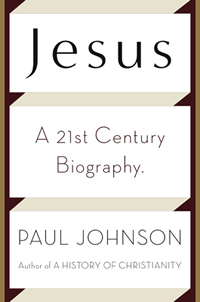Book Notes
 Paul Johnson, Jesus: A Biography from a Believer (New York: Viking, 2010), 242pp.
Paul Johnson, Jesus: A Biography from a Believer (New York: Viking, 2010), 242pp.
With over forty books and numerous awards to his credit, the British Roman Catholic Paul Johnson is recognized as one of today's pre-eminent historians, journalists, and public intellectuals, so it's encouraging to have a book by him in which he unabashedly professes his faith. "My desire," he says about this book, "is to convey the joy and nourishment I receive in following Jesus's footsteps and pondering his words." He especially shines when he elucidates the gospels with his knowledge of ancient Mediterranean history. For Johnson, the four gospels "are the truth. What they tell us actually happened" (222).
Nevertheless, I was hoping for much more from a scholar of Johnson's caliber. The book is little more than a simple rehearsal of the gospel narratives with long quotes. I appreciated his unapologetic affirmation of the gospel's authenticity and accuracy, but was disappointed at the total lack of critical inquiry or theological commentary. I found his use of the King James Version strange and at times off-putting, as with John the Baptist's confession, "whose shoe's latchet I am not worthy to unloose." There's nothing at all personal in the book, which instead has the feel of a detached scholar. He repeatedly insists that Jesus's work was "entirely spiritual" and a-political, to prepare us for heaven rather than to engage us in the present world. And numerous passages cried out for explanation, like this one on the Transfiguration: "Jesus was partly outside the structure of time and space… a man, but not only a man. He was also God, Son of the Father. He was living outside time and space, as well as upon the earth" (82, 152). If you have time to read 200 pages, skip this book and read Garry Wills' What Jesus Meant or Mary Gordon's Reading Jesus. Better yet, just read the four gospels.


